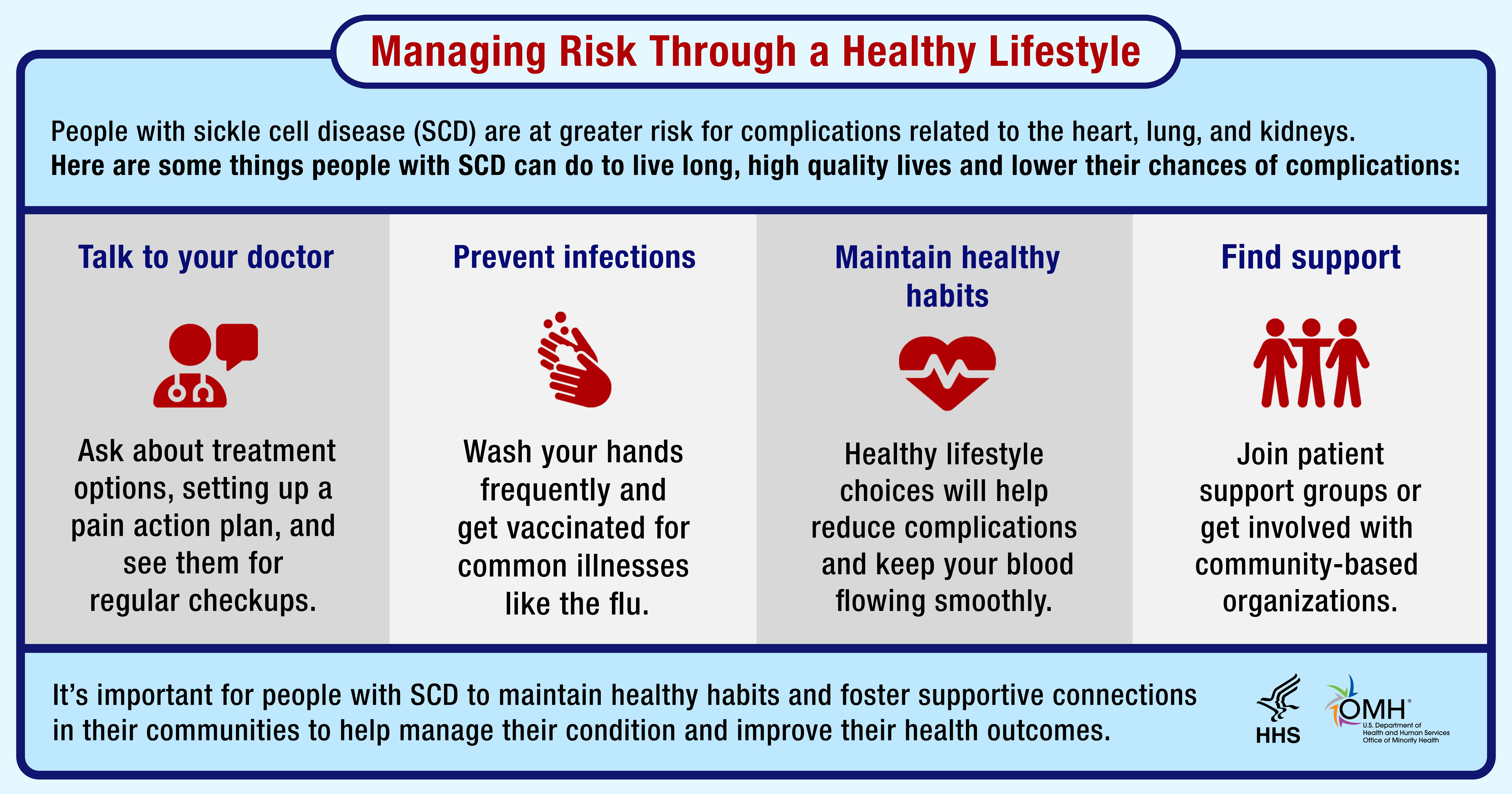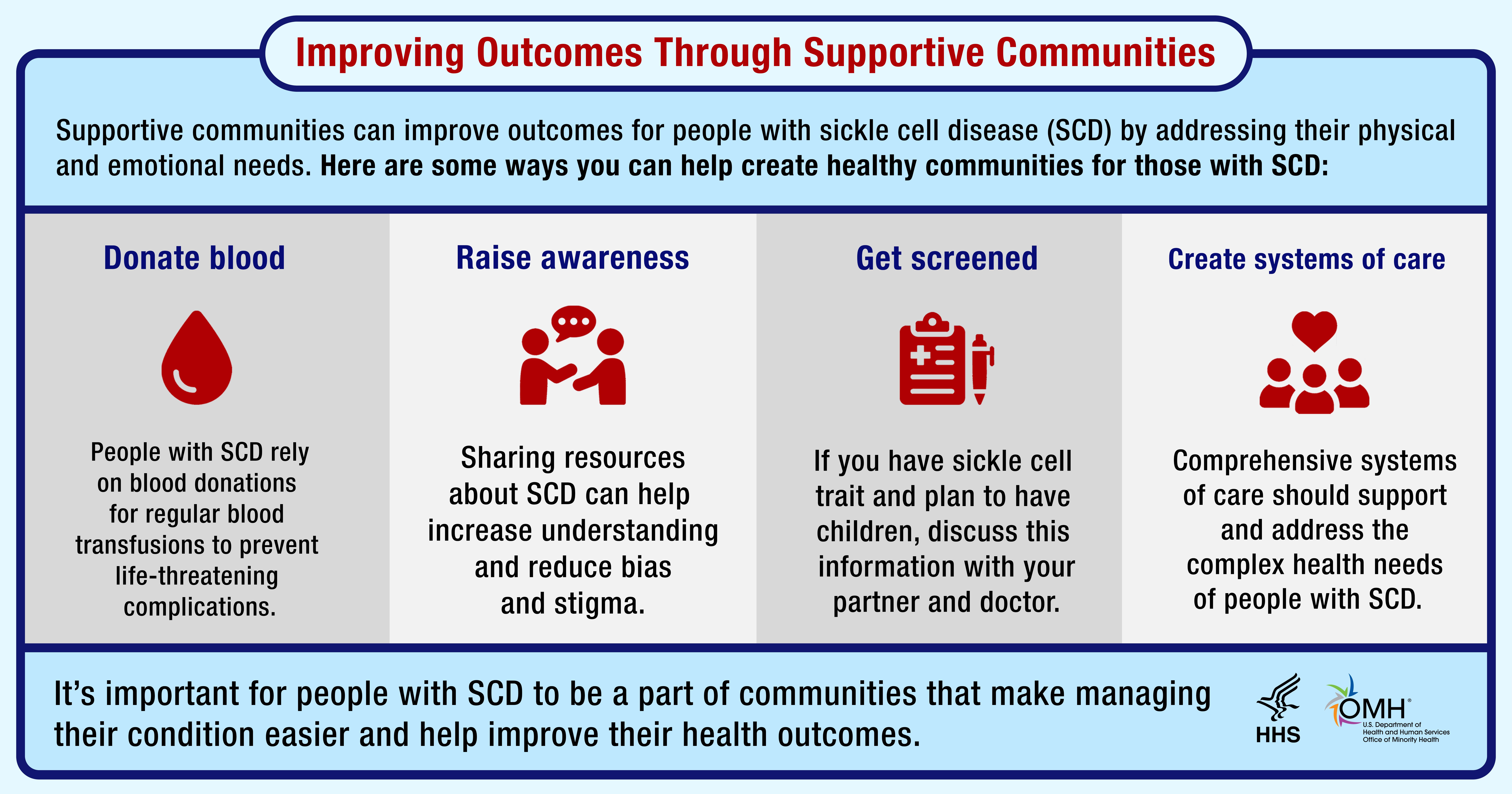
September is National Sickle Cell Awareness Month!
This annual observance began in 1975 and gained official recognition from the federal government in 1983, as a way of “reaffirming our commitment to reduce the burden of illness, disability, and premature death imposed by this disease.” National Sickle Cell Awareness Month provides an opportunity to:
- Increase public knowledge and understanding of sickle cell disease (SCD)
- Promote advancements in treatment and care
- Support expanded research into SCD and its related complications
SCD is a complex group of inherited blood disorders that affects about 100,000 people in the United States; more than 90% are non-Hispanic Black/African American, and an estimated 3%–9% are Hispanic/Latino. In addition, about 40% of individuals with SCD in the United States are children and adolescents.
Improving Health Outcomes Through Communities and Connections
This year, the HHS Office of Minority Health is commemorating National Sickle Cell Awareness Month with its theme, Improving Health Outcomes Through Communities and Connections. This theme focuses on improving health outcomes for people with SCD through community-level support and healthy lifestyle choices.
Get Involved
- Follow and tag OMH (@MinorityHealth) on X, Instagram, and Facebook.
- Use #ImprovingHealthOutcomes to share how you and your organization are making a difference.
- Connect with support and advocacy groups focused on improving care for individuals with SCD, like the National Heart, Lung, and Blood Institute’s Cure Sickle Cell Initiative.
Resources and Events
National Sickle Cell Awareness Month Toolkit
The National Sickle Cell Awareness Month Toolkit is designed to help individuals and organizations raise awareness about SCD. Download, share, and customize the content in this toolkit to meet the unique needs of your audiences.
Trust, Clinical Trials, and Transformative Therapies: Ethical Pathways in Gene Therapy and Sickle Cell Disease
Thursday, September 18, 2025, 1-2:30 p.m. ET
Part one of “Sickle Cell Disease and Gene Therapies: A Two-Part Webinar Series.” Hosted by the HHS Office for Human Research Protections, this 90-minute webinar will bring together individuals with SCD, clinical researchers, bioethics experts, and a community-based organization to explore how partners can collectively build confidence and trust around life-changing, novel SCD therapies.
Innovations and Advances in Sickle Cell Disease Gene Therapies
Thursday, September 25, 2025, 2-3:30 p.m. ET
Part two of “Sickle Cell Disease and Gene Therapies: A Two-Part Webinar Series.” Hosted by HHS OMH, this 90-minute webinar will focus on the Centers for Medicare & Medicaid Services (CMS) Cell and Gene Therapy Access Model, which leverages outcomes-based agreements to reduce costs and increase access for eligible individuals enrolled in participating state Medicaid programs. This webinar will also include presentations from a state Medicaid director and a SCD Warrior who will share about their journey through gene therapy clinical trials.
SCD Basics, News, Treatments and Therapies
About Sickle Cell Disease | Centers for Disease Control and Prevention
Sickle Cell Disease | Medline Plus
Sickle Cell Disease Gene Therapy Education Project | National Institutes of Health’s National Human Genome Research Institute
Cell and Gene Therapy (CGT) Access Model | Centers for Medicare and Medicaid Services
FDA Approves First Gene Therapies to Treat Patients with Sickle Cell Disease (press release) | U.S. Food and Drug Administration
Sickle Cell Disease (YouTube playlist) | U.S. Department of Health and Human Services
Managing SCD Complications
In people with SCD, red blood cells can become rigid and deform into a crescent or sickle shape. Sickled cells die early and often become lodged in small blood vessels, restricting blood flow, which can lead to serious health problems throughout the body. SCD-associated complications include anemia, acute and chronic pain, infections, pneumonia and acute chest syndrome, stroke, and kidney, liver, and heart disease.
Managing Risk Through a Healthy Lifestyle

Improving Outcomes Through Supportive Communities

Date Last Reviewed: February 2026

